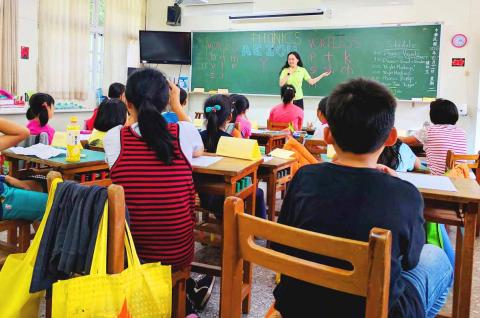Premier William Lai (賴清德) yesterday said his goal to transform Taiwan into a Mandarin-English bilingual nation by 2030 would focus on creating a trend to learn English rather than just on the provision of English-learning resources, adding that the eight strategies put forward by the National Development Council on Monday would be chiefly driven by demand rather than supply.
Lai gave the instructions during a meeting at the Executive Yuan in Taipei, Cabinet spokeswoman Kolas Yotaka told a news conference afterward.
The eight strategies are: making all official government Web sites bilingual, making official documents pertaining to foreigners bilingual, providing bilingual frontline services in public settings, making the government’s public data available in English, making laws and regulations pertaining to foreigners bilingual, promoting bilingual services in cultural and educational settings, honing civil servants’ command of English, and making professional and technical licensure exams available in English.

Photo courtesy of Jill Chen
Lai was quoted as saying that the blueprint created by the council is distinct from previous bilingual policies in that it is designed to improve the nation’s overall competitiveness rather than individuals’ ability to pass exams.
The blueprint is intended to create a trend of English learning not only for students, but the entire nation, he was quoted as saying.
Since the blueprint is primarily focused on building a bilingual environment in the education system, the Ministry of Education should ease relevant regulations and propose amendments to the Legislative Yuan within three months, the premier was quoted as saying.
In addition, all Cabinet-level agencies should improve the English proficiency of their staff, and all ministers and deputy ministers should be able to communicate well enough in English to convey important messages to the international media in real time, he was quoted as saying.
The council would not set aside a dedicated budget for the bilingual policy, which is to be implemented by agencies using readily available English-learning resources and the budgets they have been given, he was quoted as saying.
“We hope to drive supply with demand and maximize the benefits with minimum costs in the pursuit of making Taiwan a bilingual nation by 2030,” Lai was quoted as saying.
The premier also asked local governments to provide assistance to the central government in realizing this goal, Kolas said.
Taiwan is often perceived by foreigners as having a good English-learning environment, but lacking a good command of English, which is why it is absolutely necessary to improve English proficiency, council Minister Chen Mei-ling (陳美伶) said.
As education would be key to realizing the goal, certain education regulations would need to be relaxed, she said.
So far, measures proposed by Cabinet-level agencies include launching all-English TV channels; encouraging public broadcasting companies to produce English-language programs; promoting bilingual tourism; making government procurement documents bilingual; providing English abstracts of rulings and prosecution letters for major legal cases involving foreign individuals or companies; creating an investment-friendly English environment at science and industrial parks; improving the English proficiency of ordinary workers and military personnel, as well as at medical facilities; and increasing the weighting of English proficiency in the qualification exams for recruiting diplomats, she said.

Chinese Nationalist Party (KMT) Chairman Eric Chu (朱立倫), spokeswoman Yang Chih-yu (楊智伃) and Legislator Hsieh Lung-chieh (謝龍介) would be summoned by police for questioning for leading an illegal assembly on Thursday evening last week, Minister of the Interior Liu Shyh-fang (劉世芳) said today. The three KMT officials led an assembly outside the Taipei City Prosecutors’ Office, a restricted area where public assembly is not allowed, protesting the questioning of several KMT staff and searches of KMT headquarters and offices in a recall petition forgery case. Chu, Yang and Hsieh are all suspected of contravening the Assembly and Parade Act (集會遊行法) by holding

PRAISE: Japanese visitor Takashi Kubota said the Taiwanese temple architecture images showcased in the AI Art Gallery were the most impressive displays he saw Taiwan does not have an official pavilion at the World Expo in Osaka, Japan, because of its diplomatic predicament, but the government-backed Tech World pavilion is drawing interest with its unique recreations of works by Taiwanese artists. The pavilion features an artificial intelligence (AI)-based art gallery showcasing works of famous Taiwanese artists from the Japanese colonial period using innovative technologies. Among its main simulated displays are Eastern gouache paintings by Chen Chin (陳進), Lin Yu-shan (林玉山) and Kuo Hsueh-hu (郭雪湖), who were the three young Taiwanese painters selected for the East Asian Painting exhibition in 1927. Gouache is a water-based

Taiwan would welcome the return of Honduras as a diplomatic ally if its next president decides to make such a move, Minister of Foreign Affairs Lin Chia-lung (林佳龍) said yesterday. “Of course, we would welcome Honduras if they want to restore diplomatic ties with Taiwan after their elections,” Lin said at a meeting of the legislature’s Foreign Affairs and National Defense Committee, when asked to comment on statements made by two of the three Honduran presidential candidates during the presidential campaign in the Central American country. Taiwan is paying close attention to the region as a whole in the wake of a

OFF-TARGET: More than 30,000 participants were expected to take part in the Games next month, but only 6,550 foreign and 19,400 Taiwanese athletes have registered Taipei city councilors yesterday blasted the organizers of next month’s World Masters Games over sudden timetable and venue changes, which they said have caused thousands of participants to back out of the international sporting event, among other organizational issues. They also cited visa delays and political interference by China as reasons many foreign athletes are requesting refunds for the event, to be held from May 17 to 30. Jointly organized by the Taipei and New Taipei City governments, the games have been rocked by numerous controversies since preparations began in 2020. Taipei City Councilor Lin Yen-feng (林延鳳) said yesterday that new measures by